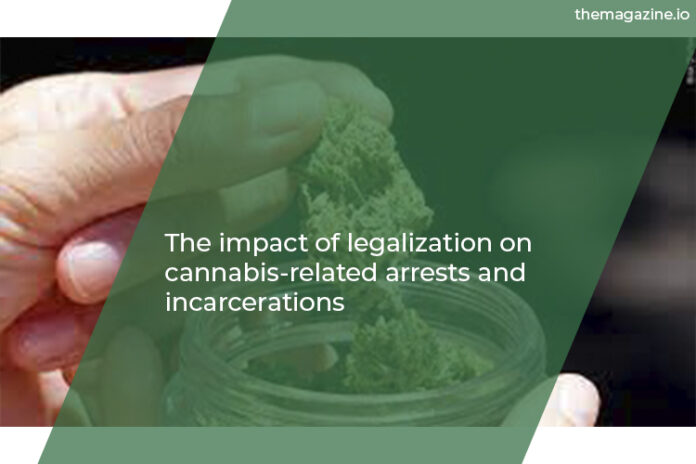The legalization of cannabis has had a significant impact on cannabis-related arrests and incarcerations. Prior to legalization, cannabis was illegal in most countries, and law enforcement agencies would often arrest and incarcerate individuals for possessing, selling, or cultivating cannabis. However, with the legalization of cannabis, many jurisdictions have reevaluated their approach to drug policy, resulting in a decline in cannabis-related arrests and incarcerations.
In the United States, for example, the legalization of cannabis has led to a significant reduction in the number of cannabis-related arrests and incarcerations. According to the FBI’s Uniform Crime Reporting (UCR) Program, the number of cannabis-related arrests in the United States peaked at 858,408 in 2010. However, by 2020, this number had dropped to 545,602, a decrease of 36.4%. This decline can be attributed in part to the legalization of cannabis for medical and/or recreational use in several states.
Furthermore, legalization has also reduced the racial disparities that exist within cannabis-related arrests and incarcerations. Prior to legalization, people of color were disproportionately affected by cannabis-related arrests and incarcerations, despite similar usage rates to their white counterparts. However, as more jurisdictions legalize cannabis, the racial disparities in cannabis-related arrests and incarcerations have begun to decrease.
For example, in Colorado, where cannabis was legalized for recreational use in 2014, the number of cannabis-related arrests for African Americans has decreased by 95% between 2012 and 2017. Similarly, in Washington, where cannabis was also legalized for recreational use in 2014, the number of cannabis-related arrests for African Americans has decreased by 90% between 2012 and 2019.
Legalization has also had a positive impact on the criminal justice system. By reducing the number of cannabis-related arrests and incarcerations, resources previously allocated to enforcing cannabis laws can be reallocated to other areas of law enforcement. This can lead to more effective policing, as well as a reduction in the burden on the criminal justice system.
Moreover, legalization has also had economic benefits. In addition to generating tax revenue for state and local governments, legalization has created new job opportunities within the cannabis industry. According to a report by Leafly, the legal cannabis industry in the United States now employs over 321,000 people, with the number of jobs increasing by 32% in 2020 alone. These jobs range from budtenders and cultivators to lawyers and accountants, providing economic opportunities for individuals across various industries.
In conclusion, the legalization of cannabis has had a significant impact on cannabis-related arrests and incarcerations. By reducing the number of cannabis-related arrests and incarcerations, legalization has helped to reduce racial disparities, free up resources within the criminal justice system, and create economic opportunities within the cannabis industry. As more jurisdictions continue to legalize cannabis, it is likely that these positive impacts will continue to be felt.



